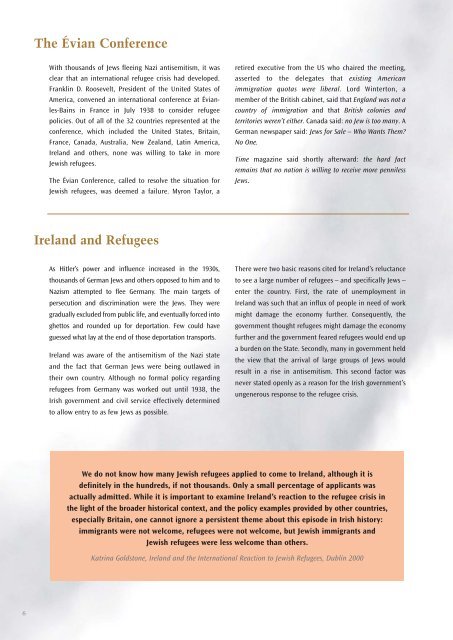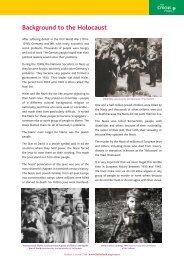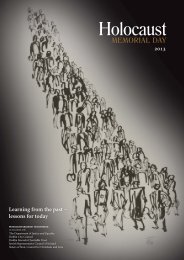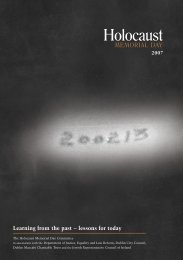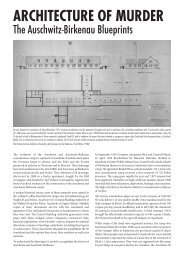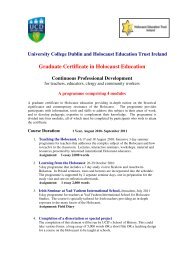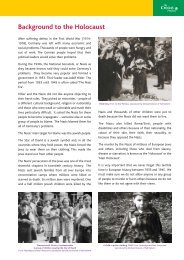Learning from the past ~ lessons for today - Holocaust Education ...
Learning from the past ~ lessons for today - Holocaust Education ...
Learning from the past ~ lessons for today - Holocaust Education ...
Create successful ePaper yourself
Turn your PDF publications into a flip-book with our unique Google optimized e-Paper software.
The Évian Conference<br />
With thousands of Jews fleeing Nazi antisemitism, it was<br />
clear that an international refugee crisis had developed.<br />
Franklin D. Roosevelt, President of <strong>the</strong> United States of<br />
America, convened an international conference at Évianles-Bains<br />
in France in July 1938 to consider refugee<br />
policies. Out of all of <strong>the</strong> 32 countries represented at <strong>the</strong><br />
conference, which included <strong>the</strong> United States, Britain,<br />
France, Canada, Australia, New Zealand, Latin America,<br />
Ireland and o<strong>the</strong>rs, none was willing to take in more<br />
Jewish refugees.<br />
The Évian Conference, called to resolve <strong>the</strong> situation <strong>for</strong><br />
Jewish refugees, was deemed a failure. Myron Taylor, a<br />
retired executive <strong>from</strong> <strong>the</strong> US who chaired <strong>the</strong> meeting,<br />
asserted to <strong>the</strong> delegates that existing American<br />
immigration quotas were liberal. Lord Winterton, a<br />
member of <strong>the</strong> British cabinet, said that England was not a<br />
country of immigration and that British colonies and<br />
territories weren’t ei<strong>the</strong>r. Canada said: no Jew is too many. A<br />
German newspaper said: Jews <strong>for</strong> Sale – Who Wants Them?<br />
No One.<br />
Time magazine said shortly afterward: <strong>the</strong> hard fact<br />
remains that no nation is willing to receive more penniless<br />
Jews.<br />
Ireland and Refugees<br />
As Hitler’s power and influence increased in <strong>the</strong> 1930s,<br />
thousands of German Jews and o<strong>the</strong>rs opposed to him and to<br />
Nazism attempted to flee Germany. The main targets of<br />
persecution and discrimination were <strong>the</strong> Jews. They were<br />
gradually excluded <strong>from</strong> public life, and eventually <strong>for</strong>ced into<br />
ghettos and rounded up <strong>for</strong> deportation. Few could have<br />
guessed what lay at <strong>the</strong> end of those deportation transports.<br />
Ireland was aware of <strong>the</strong> antisemitism of <strong>the</strong> Nazi state<br />
and <strong>the</strong> fact that German Jews were being outlawed in<br />
<strong>the</strong>ir own country. Although no <strong>for</strong>mal policy regarding<br />
refugees <strong>from</strong> Germany was worked out until 1938, <strong>the</strong><br />
Irish government and civil service effectively determined<br />
to allow entry to as few Jews as possible.<br />
There were two basic reasons cited <strong>for</strong> Ireland’s reluctance<br />
to see a large number of refugees – and specifically Jews –<br />
enter <strong>the</strong> country. First, <strong>the</strong> rate of unemployment in<br />
Ireland was such that an influx of people in need of work<br />
might damage <strong>the</strong> economy fur<strong>the</strong>r. Consequently, <strong>the</strong><br />
government thought refugees might damage <strong>the</strong> economy<br />
fur<strong>the</strong>r and <strong>the</strong> government feared refugees would end up<br />
a burden on <strong>the</strong> State. Secondly, many in government held<br />
<strong>the</strong> view that <strong>the</strong> arrival of large groups of Jews would<br />
result in a rise in antisemitism. This second factor was<br />
never stated openly as a reason <strong>for</strong> <strong>the</strong> Irish government’s<br />
ungenerous response to <strong>the</strong> refugee crisis.<br />
We do not know how many Jewish refugees applied to come to Ireland, although it is<br />
definitely in <strong>the</strong> hundreds, if not thousands. Only a small percentage of applicants was<br />
actually admitted. While it is important to examine Ireland’s reaction to <strong>the</strong> refugee crisis in<br />
<strong>the</strong> light of <strong>the</strong> broader historical context, and <strong>the</strong> policy examples provided by o<strong>the</strong>r countries,<br />
especially Britain, one cannot ignore a persistent <strong>the</strong>me about this episode in Irish history:<br />
immigrants were not welcome, refugees were not welcome, but Jewish immigrants and<br />
Jewish refugees were less welcome than o<strong>the</strong>rs.<br />
Katrina Goldstone, Ireland and <strong>the</strong> International Reaction to Jewish Refugees, Dublin 2000<br />
6


